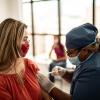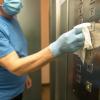
Amid an Intensifying Pandemic, the Drive to Understand Its Toll
Within days of the first confirmed coronavirus case in Ghana on March 12, 2020, Jerry John Nutor, PhD, RN, wasted no time in leveraging his professional network and partnerships with health systems to launch a new study assessing the readiness of health care workers in underserved countries in confronting COVID-19.
Nutor, an assistant professor at the UCSF School of Nursing, partnered with Patience Afulani, PhD, MD, MPH, assistant professor at UCSF Epidemiology and Biostatistics, to apply for the university’s COVID-19 Pilot Grant that supported rapid responses to the coronavirus. Even before they were awarded the grant, they began designing a survey for health care workers in Ghana and Kenya.
Their findings exposed high levels of job dissatisfaction, stress and burnout. Now Nutor is building off what they’ve learned to embark on a new study — this time in California.
“We pray COVID won’t happen again, but we must learn from this experience so we are prepared for future pandemics,” Nutor said.
Nutor is one of the experts at the UCSF School of Nursing who leveraged networks and research begun before the pandemic to launch new studies with a focus on COVID-19. By incorporating new dimensions into their work, they have illuminated how this public health crisis has impacted communities — particularly vulnerable populations such as health care workers in underserved parts of the globe; the Asian American, Native Hawaiian and Pacific Islander communities; and sexual and gender minorities.
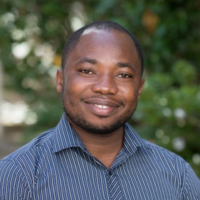
Understanding Anxiety, Burnout Among Health Care Providers
From April 17 to May 31, 2020, Nutor and his colleagues surveyed 1,009 nurses, physicians and allied health care workers in Ghana and Kenya to assess their readiness in managing COVID-19.
Their findings, published in October 2021 in Global Public Health Journal, found that 38% of survey respondents had high levels of job dissatisfaction. About 62% did not feel prepared to manage the coronavirus crisis, 70% reported stress and 69% experienced burnout. The team found a direct correlation between feelings of stress, burnout and anxiety and workers’ fears of being infected — and then infecting family and friends.
Nutor and his team recommended that government agencies institute a series of interventions, including ensuring adequate training for workers, providing personal protective equipment, opening isolation wards and developing clear guidelines for prevention and management of COVID-19.
Nutor is using what they’ve learned to embark on a new study in California.
Backed by a one-year, $100,000 grant from the California Department of Public Health, Nutor and his team will examine COVID’s impact on the mental health of Black and Latino nurses statewide. He plans to recruit 500 nurses starting this summer. Data will be captured through online surveys, focus group discussions and interviews.
Interventions the team creates can be replicated beyond California’s borders, Nutor said.
“Stress, burnout and mental health are issues that cut across the country,” Nutor said. “During the pandemic, mental health has been a big challenge for everybody but especially health care workers and among minority groups.”
First-of-its-Kind Study Examines AANHPI Experience
Professor Van Ta Park, PhD, MPH, was similarly fueled by the need to understand the pandemic’s impact on a vulnerable population: Asian Americans, Native Hawaiians and Pacific Islanders (AANHPI) communities.
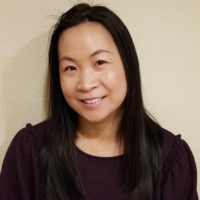
Park and her colleagues are the architects of the CARE Registry, the first database of its kind that seeks to facilitate meaningful inclusion of AANHPI communities in health and clinical research studies. The registry achieved a major milestone this year, registering 10,000 AANHPI adults who are willing to participate in research on Alzheimer’s and other dementias, aging, caregiving and other health topics.
In 2020 as the pandemic intensified and upended daily life, Park launched an ancillary study called COMPASS. COMPASS surveyed AANHPI adults within the CARE Registry as well as other AANHPI adults who were not enrolled in CARE from October 2020 to May 2021 about their experience with COVID-related discrimination, vaccine willingness and issues around health care access, caregiving, employment and social support. A follow-up survey from December 2021 to May 2022 examined longer term impacts.
More than 5,400 took the COMPASS survey online, by phone or in person. Findings from the 2023 report include: about three in five participants reported experiencing discrimination within the past six months, and 59% believed the country has become more dangerous for AANHPI communities, a number that climbed to 67.6% in the follow-up survey. About 25% responded “unsure” or “probably/definitely no” about getting the vaccine; concern about side effects was the most common reason given.
“To our knowledge, COMPASS is the first national and largest multi-lingual COVID study of AANHPI adults,” Park said. “It’s important that we understand the AANHPI populations’ experience during the pandemic, so we can respond to the needs of our diverse communities.”
Shedding Light on Impact on Gender and Sexual Minorities
Annesa Flentje, PhD, associate professor at the UCSF School of Nursing, has been studying the health of LGBTQIA+ individuals well before the pandemic.
Flentje is associate director of The PRIDE Study, a long-term national study that strives to understand how being LGBTQIA+ affects an individual’s physical, mental and social health. Since 2017, over 24,000 people nationwide have enrolled in the study.
“We have a lot of healthy people in the LGBTQIA+ community but we also see a greater risk of health disparities among gender and sexual minority people,” Flentje said. “Stigma, stress from discrimination and difficulty getting jobs, avoiding medical care — these are all things that can make health disparities greater.”
When the coronavirus emerged in early 2020, she knew it would take a toll on the already vulnerable LGBTQIA+ community. The question was how.
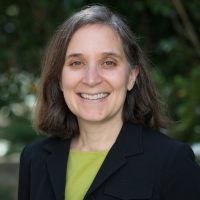
She and her colleagues quickly developed and dispatched two COVID-19 surveys to participants of The PRIDE Study with whom they had already built a relationship.
The first survey focused on the coronavirus’ impact on mental health, behavior and social interactions. A follow-up survey examined this impact over time and looked at vaccine uptake. About 5,000 people took these surveys.
Flentje and her colleagues found increases in anxiety and depression coinciding with the onset of the pandemic, and a direct tie between higher anxiety and exposure to COVID-19 news.
More findings are on the way. While the two COVID surveys closed in 2021, The PRIDE Study has added COVID questions to its annual survey to document the pandemic’s long-term impact. The team is collaborating with other researchers to further examine the data and issue recommendations.
“We have unanswered questions about COVID. We lost a lot of people to COVID, but I don’t see much about the impact of grief at the individual level. We also want to look at what happened to people’s employment and other determinants of health,” Flentje said. “It’s important for us to understand these impacts so we can heal and learn.”

